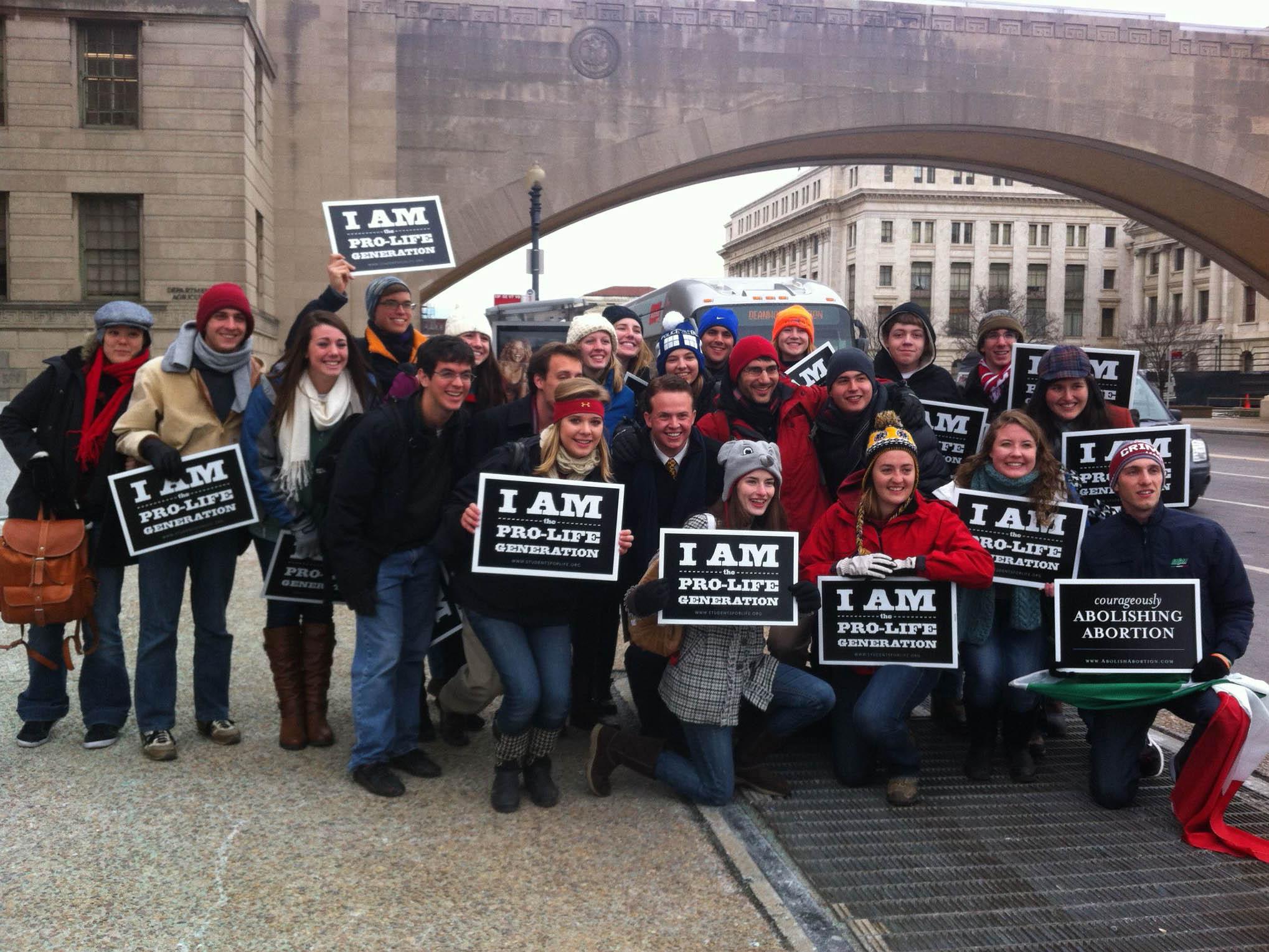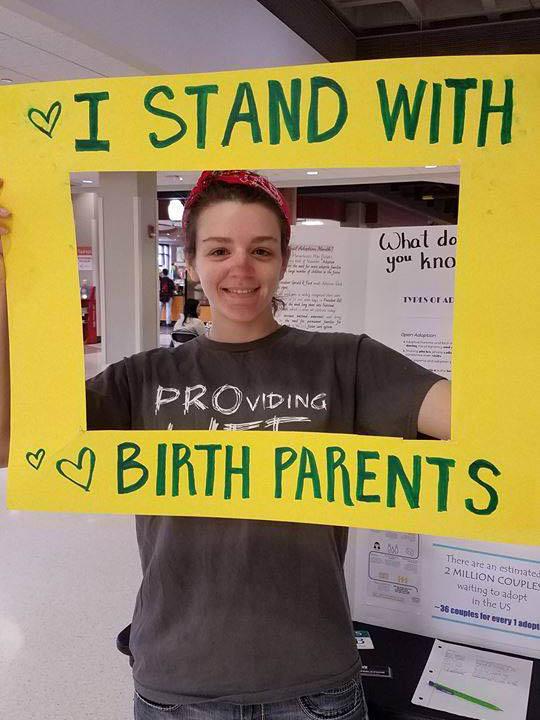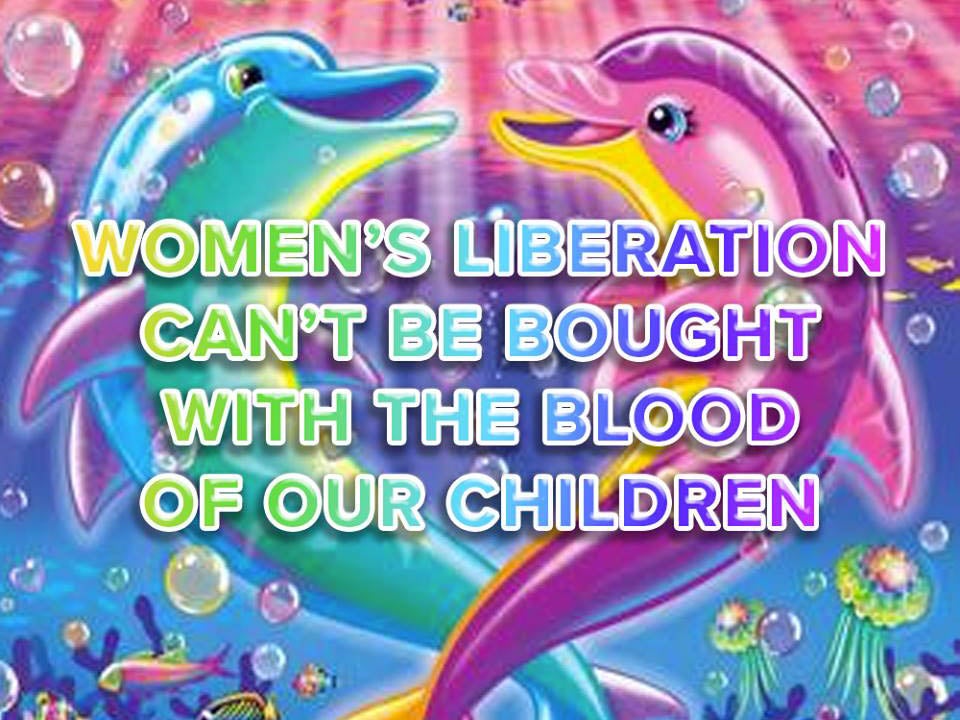Alabama students are fighting to save more than just unborn babies
Typically, the pro-life lobby attracts white, gun-toting conservative men who hate women and back the death penalty. But Holly Baxter discovers the movement has had a facelift, luring younger female activists who also support refugees, prisoners and, surprisingly, pregnant women


Tuscaloosa is a small, picturesque college town in the centre of the state, home to the University of Alabama and their formidable football team the Crimson Tide. “When you come to Tuscaloosa, you say, ‘Roll tide’,” explains Georgia Gallagher, when we meet on a bench just outside campus at lunchtime. That’s the team’s chant, which you can find written on posters round the city and emblazoned on sweaters and T-shirts in local stores. People say it to each other as they pass on the street during big game days.
The university takes community seriously, which is why Gallagher chose to study here in the first place. She went to a close-knit school in her own state, she says, as we cross the campus and come to an air-conditioned Starbucks to shelter from the heat. She chose the University of Alabama because it had a reputation for being especially social and a selection of good sororities to join (the Greek life as it’s often referred to).
Gallagher lives in Alpha Delta Pi, where each student pays a certain amount to the organisation in exchange for room and board. They even have their own chef, she mentions proudly. Greek life sometimes gets a bad rep: not a year goes by without a “mean girls” story about rejection and bullying, and murky tales of hazing and “pledging’’ have led to criminal trials in the past. But Alpha Delta Pi is a relatively wholesome organisation, where young women are expected to keep up certain grades and to do a certain amount of charity work on top of that.
Until recently, Gallagher was also president of the pro-life college organisation, Bama Students for Life (BSL). The group describes itself as fostering “a culture for life on campus and beyond so that one day our world will respect the dignity of every human life”. Its members are prolific on social media, and the official Twitter account’s pinned tweet shows a group of fresh-faced college students marching against abortion in Washington DC, holding up signs that include “Killing a baby is no way to plan parenthood” and “Choose life – your mom did”.
Gallagher is keen to emphasise that the group doesn’t just oppose abortion (though that does seem to be its main remit): it also opposes the death penalty, and helps out young mothers who have “chosen life” by providing free babysitting and necessities like nappies and baby food in exchange for points accrued by mothers who attend parenting classes (which often have a religious slant.) The group’s tweets also include signs that urge people to protect “the immigrant”, “the refugee” and “the imprisoned” alongside “the unborn”.
A university might seem an unusual place to find a group of anti-abortion protesters, but in America pro-life sentiment has been growing since the 1990s. It is now, according to Gallup, more common for Americans to describe themselves as “pro-life” than “pro-choice” (in 1995, the situation was reversed.)
University students like Galloway are aware that the traditional image of the “pro-lifer” is of a middle-aged conservative man, who rails against abortion while backing the death penalty and owning a gun. Liberal voices have long mocked conservatives for holding such contradictory viewpoints, and accused them of merely wanting to control women’s bodies under the guise of caring about babies. You can’t preach about the sanctity of life or “playing God” while also advocating for prisoners to be killed, they say.

Pro-life groups such as BSL are much more savvy. They welcome feminists, saying the patriarchy is the reason women feel socially unsupported or financially unable to carry their pregnancies to full term. They oppose the death penalty and mass incarceration. They support asylum-seekers and refugees, and take issue with children being separated from their parents on the US-Mexico border.
Being pro-life means choosing life for prisoners, choosing a better life for immigrants, supporting women to carry their pregnancies to full term and helping to provide for the children afterwards. They preach compassion and state that they are pro-women, meaning that their message is much more palatable to young university students, who tend to skew liberal. They use the language of feminism and civil rights (“Equal dignity. Equal rights. Nonviolent choices,” reads one of their posters.) In 2019, the pro-life movement has had a facelift.
Gallagher joined the group after talking to students at freshers’ week. She wasn’t interested at first, she says, even though she was raised pro-life (her mother chose to have her after an accidental pregnancy at a young age, and raised Georgia alone.) She worried that the worst things people said about pro-lifers might be untrue; that they might be anti-feminist, or militant.
But the members at the fair “just kept calling and texting”, and eventually she found herself at a meeting. It fit in well with her sorority commitments: sponsorship campaigns such as “Pie a Pro-Lifer” or the April “Barbecue for Babies” satisfy the charity work requirements, as did her “counsellor training”.
Gallagher refers to pro-life people who stand outside reproductive health clinics as counsellors, who don’t shout obscenities or intimidate women visiting the clinics. Instead, she says, members of BSL go on courses to learn how to approach people and talk them into “seeing their baby on an ultrasound scan” or explain their financial worries so that pro-life groups can “help make it easier to keep their babies”. She has stayed in touch with the first woman she ever counselled away from abortion, and says the first time she saw the baby was “emotional”. She still babysits that woman’s children.

Where does Gallagher stand on rape and incest, and might these be justifiable grounds for an abortion? She has friends who were raped but they see their babies as “something good which came out of a terrible experience”. She mentions one friend who was raped by a family member and who lost a “much-wanted child” through miscarriage, citing her experience as a reminder that some people find joy in the worst situations.
Other people might not feel that way, and might appreciate having the choice to abort. She isn’t interested in banning abortions by law, but wants to see a culture change where “every woman, no matter what situation she’s in or how old she is, can say, ‘I’m pregnant,’ and the default answer isn’t, ‘Oh no’ or, ‘What are you going to do?’ but, ‘congratulations, I’m so excited for you. What can I do to make things easier?’”
Although Gallagher doesn’t support taking away pro-choice legislation, BSL does feature photographs of students holding up signs saying “Defund Planned Parenthood” on their website. Defunding Planned Parenthood could well be seen by many as a de facto abortion ban for a sizeable proportion of the US population. In many states, Planned Parenthood clinics are the only places for hundreds of miles where anyone might be able to access contraception or a termination.
Bama Students for Life is a mainly female organisation, but there are a couple of male members, and Iain Athey is happy to be interviewed and keen to explain why joining Bama Students for Life felt so natural for him.
“My [pro-life] journey began in college,” he says. He went to a “small, preppy Catholic school” and was brought up religious but says that that isn’t the reason he’s pro-life: instead, it’s because of science. “I am Catholic, and a lot of people say, ‘Oh, you’re just shoving your religion down people’s throats,’” he says, “but whenever I’m speaking to people on campus [about abortion], it’s the thing I try to steer away from because religion isn’t a scientific endeavour. I believe abortion is wrong for religious reasons, yes, but… the scientific reasons I’ve looked up are what really convinced me.”
What are those scientific reasons? He cites “a group of doctors who are against abortions for medical reasons” and says they have good reason to believe a termination should only ever be a “last resort”. He adds that “a basic understanding of evolutionary biology” shows that when a man and a woman’s DNA comes together, the DNA of a new, separate human being is created. That potentiality, he says, means that there is a “new person” from the moment of conception.
“Once or twice I’ve been met with [the reaction], ‘If you’re a man, how can you have an opinion on this?’” he says.
“I understand it’s a very touchy subject and it might not be something I ever have to deal with. But I’m probably never going to get ALS or experience [a learning disability] but I can still advocate for fair treatment of the disabled.” Does he support the Alabama abortion ban? No, he says, but he thinks a heartbeat bill is a good idea. Nevertheless, like Gallagher, he would rather we as a society “focus more on the heaviness of life, the purpose and value of human life” instead of jumping to legislate.
I asked Gallagher what should happen if a pregnant woman wants to abort but her male partner wants her to keep the baby. She replied that the woman should keep the baby and the male partner should be solely responsible for raising it from then on. This seems to raise more questions than it answers. Is the life of an embryo really equal to the life of someone who has survived domestic violence?
Is a foetus in as much danger as a person living under enslavement? What happens if handing over the baby to her former male partner isn’t an acceptable alternative to the pregnant woman? How long do you support a woman financially or otherwise if she decided not to terminate based on your advice? And if you extend personhood and “human rights” to a foetus, what happens when you have to choose between that life and the life of the mother in an emergency?
Underneath the inclusive language and the youthful positivity is a host of difficult questions. The pro-life movement seems to have a much friendlier face in 2019 – but time will tell whether that’s because of an overhaul in attitude, or merely an expensive facelift.
Join our commenting forum
Join thought-provoking conversations, follow other Independent readers and see their replies
Comments